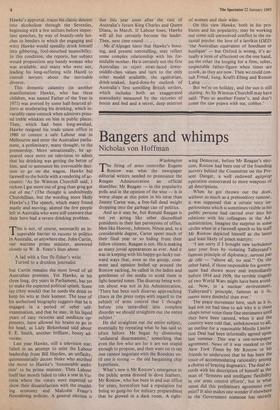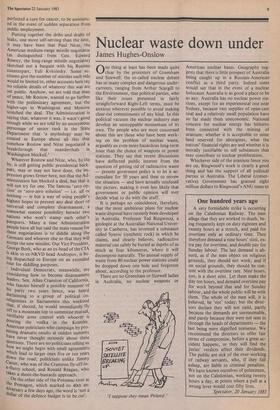Bangers and whimps
Nicholas von Hoffman
Washington The firing of arms controller Eugene Rostow was what the newspaper editorial writers needed to pronounce the Reagan Administration an official shambles: Mr Reagan — in the popularity polls and in the opinion of the wise — is in worse shape at this point in his term than Jimmy Carter was, a free-fall dead weight dropping into the garbage can of politics.
And so it may be, but Ronald Reagan is not yet acting like other discredited presidents in their last paroxysms of office. Men like Hoover, Johnson, Nixon and, to a considerable degree, Carter spent much of their final year or so hiding from their fellow citizens. Reagan is not. He is making as many jovial appearances as ever. And it was in keeping with his happy-go-lucky out- ward ways that, even as the gossip, com- ment and opinion boiled up around the Rostow sacking, he called in the ladies and gentlemen of the media to scold them in light-hearted tones. The disarray being writ- ten about was not in his Administration. 'There has been such disarray approaching chaos in the press corps with regard to the subject of arms control that I thought before you unravelled into complete disorder we should straighten out the entire subject.'
He did straighten out the entire subject, essentially by repeating what he has said so often before. He began by dismissing 'unilateral disarmament,' something that even the few who are for it are not stupid enough to propose, and then went on to say one cannot negotiate with the Rooskies un- til one is strong — the old bargaining chip hypothesis.
What's new is Mr Rostow's emergence in the public arena dressed in dove feathers. Mr Rostow, who has been in and out office for years, heretofore had a reputation for being so gung-ho for military preparedness that he glowed in a dark room. A right- wing Democrat, before Mr Reagan's elec- tion, Rostow had been one of the founding movers behind the Committee on the Pre- sent Danger, a well endowed agitprop operation consecrated to more weapons of all descriptions.
When he got thrown out the door, without so much as a premonitory rumour, it was supposed that a certain testy im- periousness which is sometimes visible in his public persona had carried over into his relations with his colleagues in the Ad- ministration. Imagine the surprise in some circles when in a farewell speech to his staff Mr Rostow depicted himself as the latest and least likely of peace martyrs: 'I am sorry if I brought new turbulence into your lives by violating Talleyrand's famous principle of diplomacy, surtout pas de zele — "above all, no zeal." On the other hand, if those responsible for govern- ment had shown more zeal immediately before 1914 and 1939, the terrible tragedy of two World Wars might have been avoid- ed. Now, in a nuclear environment, Talleyrand's principle, famous as it is, seems more doubtful than ever.'
The peace movement here, such as it is, had not yet had time to ask why it is these chaps never voice these fine sentiments until they have been canned, when it and the country were told that, unbeknownst to all, an outline for a reasonable Missile Limita- tion Deal had been informally agreed upon last summer. This was a one-newspaper agreement. News of it was sneaked to the New York Times by Mr Rostow or his friends to underscore that he has been the voice of accommodating rationality among a chorus of braying dogmatics. The deal ac- cords with his description of himself as the man of 'firmness and intelligent flexibility in our arms control efforts', but in what sense did this preliminary agreement ever exist? It also makes one wonder if elsewhere in the Government someone has secretly
perfected a cure for cancer, to be announc- ed in the event of sudden separation from public employment.
Putting together the dribs and drabs of leaks, one more self-serving than the next, it may have been that Paul Nitze, the American medium-range missile negotiator (as distinguished from Gen. Edward Rowny, the long-range missile negotiator) sketched out a bargain with his Russian counterpart, Yuli Kvitsinsky. Some ac- counts give the number of missiles each side would be limited to, other accounts here say no reliable details of whatever this was are yet public. Anyhow, we are told that man of peace, Mr Rostow, wanted to go further with the preliminary agreement, but the higher-ups in Washington and Moscow scotched the deal. The Administration is saying that, whatever it was, it wasn't good enough while we are told by an anonymous Personage of senior rank in the State Department that 'a mythology may be created in Europe about all this that somehow Rostow and Nitze negotiated a breakthrough that neanderthals in Washington blocked.'
Whatever Rostow and Nitze, who, by the by, is still getting public presidential back- pats, may or may not have done, the im- pression grows firmer here, not that the Ad- ministration has blocked a deal, but that it will not try for one. The famous 'zero op-
tion' or 'zero-zero solution' — i.e. all or nothing — is but a way of using people's
highest hopes to prevent any deal short of universal and complete disarmament, a somewhat remote possibility betwixt two nations who won't stamp each other's Passports. Many a time Administration People have all but said the main reason for these negotiations is to diddle along the Germans and whoever else so that they will accept the new missiles. Our Vice President,
George Bush, who as an ex-head of the CIA is akin to ex-NKVD head Andropov, is be- ing dispatched to Europe on an extended tour for diddling purposes.
Individual Democrats, meanwhile, are considering how to become disarmament leaders. Sen. Allan Cranston of California, who fancies himself a possible nominee of his party two years hence, was heard declaiming to a group of political co-
religionists in Sacramento this weekend that, if elected, he would immediately fly
off to a mountain top to summitise mutual, verifiable arms control with whoever is Pouring the vodka in the Kremlin. American politicians who campaign by pro- mising dramatic results at sudden summits have never thought seriously about these questions. There are no politicians telling us how we might begin with small agreements
which lead to larger ones five or ten years down the road; politicians unlike Jimmy Carter, who was of the Cranston fly-off-in- a-flurry school, and Ronald Reagan, who takes a shoot-the-bastards approach. On the other side of the Potomac river at the Pentagon, which marked its 40th an- niversary a few days ago, the word is 'not a dollar of the defence budget is to be cut'.







































 Previous page
Previous page